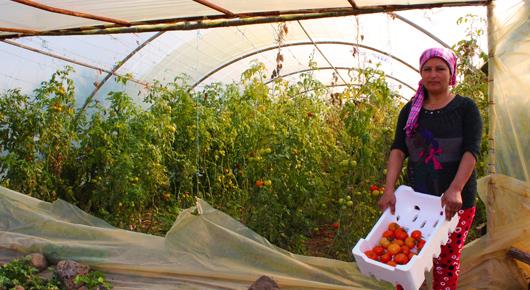FAO and EU enhance smallholder farmers’ capabilities to transform the agriculture sector in the Syrian Arab Republic

©FAOMazen Haffar – The project will benefit 45,000 smallholder farmers in up to 10 governorates across the country by emphasizing agriculture which is more demand-driven, enabling smallholder farmers to become more competitive, and to produce more sustai
23 May 2019, Damascus - The food and agriculture organization of the United Nations (FAO) and the European Union (EU) have announced a three-year project to improve agriculture in the Syrian Arab Republic through the enhancement of smallholder capabilities.
The “Smallholder Support Programme for Agriculture Transformation” project will benefit 45,000 smallholder farmers in up to 10 governorates across the country by emphasizing agriculture which is more demand-driven, enabling smallholder farmers to become more competitive, and to produce more sustainably.
The project will train smallholder farmers and livestock keepers, and provide some inputs to become more productive, more efficient and more profitable; in addition, the farmers will become better informed, more self-organized and more risk-aware.
In his opening speech, the FAO representative in the Syrian Arab Republic, Mike Robson, has stated that the project will provide farmers with access to quality seed of major cereals and pulses; it will also improve the efficient use and management of water resources, through the rehabilitation of irrigation schemes; scale-up market access for key commodities, and add value by increasing opportunities for processing and becoming more market-oriented, assisting farmers to access information and new technologies.
The project’s interventions will improve the efficiency of farmers’ crop production by improving the management of water resources with the rehabilitation of facilities, and the adoption of modern water-saving irrigation techniques by small-scale farmers, besides training farmers and up to 500 technicians on integrated water management and climate change adaptation.
In addition, FAO and EU will enhance the seed multiplication system for key strategic crops - wheat, barley, chickpeas and lentils - by involving farmers in the seed multiplication process through interaction with research and training on good seed multiplication practices.
“The seed multiplication intervention will contribute to increasing the production of quality seed, FAO aims to improve early generations and certified seed up to 75,000 tons of wheat, 30,000 tons of barley, 1,300 tons of chickpeas and 800 tons of lentil by the end of the project. Moreover, this intervention will enhance the long term availability of quality seed to farmers, and so will underpin production of cereals and food legumes in Syria,” said Alfredo Impiglia, FAO’s Chief Technical Adviser.
Furthermore, crop producers and livestock owners will be involved throughout the cycle of food production to enhance the quality of local food. This will ensure that their products are competitive in the local market, and improve their financial situation. FAO will train farmers and livestock owners on business-oriented topics, besides the enhancement of their agricultural practices, and in some cases building capacity to manage primary processing units in sub-sectors such as dairy and tomato processing at a number of locations in the Syrian Arab Republic (building on pilot work in earlier projects).
The sustainable access to an advanced early warning and information system will assist farmers to mitigate risks of crop failure due to unfavourable weather conditions, thanks to FAO and EU’s support, the farmers will become more informed and aware of the approaching weather conditions, so they can make the necessary precautions for a safer crop production.
Also, the farmers, including women and youth, will have the opportunity to create their own networks to promote their products and access new market opportunities through agribusiness hubs established by FAO and the EU. The hubs will promote discussions and agreements between farmers and traders, and will bring a wider understanding of market demand – in terms of quality and safety standards, timeliness, contractual obligations, etc. – and will help increase the income of smallholders.
This set of life-changing interventions will contribute to a model for the transformation of agriculture in Syria. The smallholder farmers will become agents of this change, proficient in managing their resources and other operational processes in the interests of food security and a better sustained livelihood.
